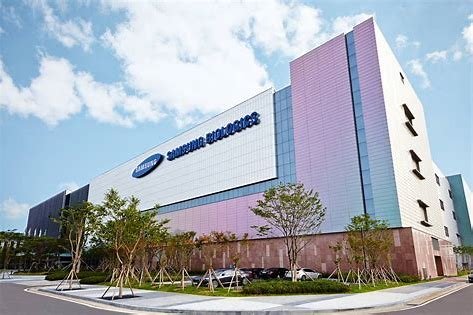Samsung Biologics Reports Second Quarter 2022 Financial Results
28 July 2022 | Thursday | News

Image Source : Public Domain
- Released consolidated financial position of the company based on its full acquisition of Samsung Bioepis completed on April 20, 2022
- Achieved record-high semi-annual revenue exceeding KRW 1 trillion
- Recorded Q2'22 revenue of KRW 503.7 billion for the company's CDMO business
- Recorded Q2'22 revenue of KRW 232.8 billion for Samsung Bioepis's biosimilars business
- Business operations remain stable with expanded base for future growth
John Rim, CEO of Samsung Biologics, stated, "Samsung Biologics delivered another strong quarterly performance ahead of our guidance with our revenue exceeding KRW 1 trillion for the first half of the year. Operations are seamless across all our plants, and the partial completion of Plant 4 is just around the corner, scheduled to commence operations in October this year. We completed a deal to fully acquire Samsung Bioepis, expanding and diversifying our revenue base and business portfolio. More recently, we have officially signed an agreement to purchase land for Bio campus II. All these factors signal that we have a strong momentum going, and that we are well on track in our expansion plans to serve the increasing market demands."
SECOND QUARTER 2022 RESULTS
Samsung Biologics demonstrated strong operational excellence and business agility in the second quarter with earnings exceeding initial projections.
Reporting under the consolidated approach for the first time since the acquisition in April, Samsung Biologics and Samsung Bioepis in the second fiscal quarter recorded a revenue of KRW 651.4 billion, operating profit of KRW 169.7 billion, and net profit of KRW 152 billion with EBITDA margin of 39.7%.
On a standalone basis, the second quarter 2022 revenue for Samsung Biologics was KRW 503.7 billion, an increase of 22.2% from KRW 412.2 billion reported for the second quarter in the previous year, due to efficiency in operations despite a scheduled slow-down of Plant 2, and attributable to the expansion of product sales.
Samsung Biologics also reported an operating profit of KRW 171.9 billion, 3.18% higher than the prior-year period, and a net profit of KRW 101.8 billion with an operating profit margin of 34.1% for the same quarter.
On a standalone basis, Samsung Bioepis earned KRW 232.8 billion in revenue, 24.2% higher than the prior-year period attributable to the increase in sales of its biosimilar products in global markets including the US and Europe. Samsung Bioepis's operating profit increased significantly by 95.7% compared to the prior-year period, at KRW 58.5 billion.
FISCAL YEAR 2022 OUTLOOK
The construction of Samsung Biologics Plant 4 is on schedule with 6 X 10KL production capacity expected to commence operations in October. The company has secured a number of large scale manufacturing contracts with active presales activities for Plant 4, and at the close of Q2, in the first half of 2022 alone, the company had secured over USD 7.9 billion in sales backlog including deals with Janssen, Merck, GSK, Lilly, and Novartis to name a few.
Earlier this month, Samsung Biologics secured additional land sized at 357,366 ㎡ and approximately 30% larger than its current site, to support the build out of its second campus. At the newly acquired site, the company will host additional large-scale manufacturing facilities as well as an open innovation facility.
Samsung Biologics also published its second annual ESG Report this month, reflecting the company's latest sustainability efforts to address a wide range of environmental, social, and governance (ESG) activities related to its business. The company aims to build an eco-friendly business environment and achieve net zero GHG emissions in its operations, and continue to enhance its social contribution activities that strive to support the health of its local communities.
Samsung Bioepis has a total of six biosimilar products approved and commercially available in different markets[1], and its revenue has steadily grown driven by increases in global product sales and milestone payments.
Of the six products, SB4, a biosimilar to Enbrel (etanercept), which was launched in Europe in 2016, has surpassed its originator's sales in Europe by overtaking the majority of the market share, and the company recently launched SB11, a biosimilar to Lucentis (ranibizumab), in June 2022 in the US. With four additional biosimilar candidates in late stage development, Samsung Bioepis is solidifying its position as a leading company in the biosimilars industry.
Most Read
- How Does GLP-1 Work?
- Innovations In Magnetic Resonance Imaging Introduced By United Imaging
- Management of Relapsed/Refractory Multiple Myeloma
- 2025 Drug Approvals, Decoded: What Every Biopharma Leader Needs to Know
- BioPharma Manufacturing Resilience: Lessons From Capacity Expansion and Supply Chain Resets from 2025
- APAC Biopharma Review 2025: Innovation, Investment, and Influence on the Global Stage
- Top 25 Biotech Innovations Redefining Health And Planet In 2025
- The New AI Gold Rush: Western Pharma’s Billion-Dollar Bet on Chinese Biotech
- Single-Use Systems Are Rewiring Biopharma Manufacturing
- The State of Biotech and Life Science Jobs in Asia Pacific – 2025
- Asia-Pacific Leads the Charge: Latest Global BioSupplier Technologies of 2025
- Invisible Threats, Visible Risks: How the Nitrosamine Crisis Reshaped Asia’s Pharmaceutical Quality Landscape
Bio Jobs
- Sanofi Turns The Page As Belén Garijo Steps In And Paul Hudson Steps Out
- Global Survey Reveals Nearly 40% of Employees Facing Fertility Challenges Consider Leaving Their Jobs
- BioMed X and AbbVie Begin Global Search for Bold Neuroscience Talent To Decode the Biology of Anhedonia
- Thermo Fisher Expands Bengaluru R&D Centre to Advance Antibody Innovation and Strengthen India’s Life Sciences Ecosystem
- Accord Plasma (Intas Group) Acquires Prothya Biosolutions to Expand Global Plasma Capabilities
- ACG Announces $200 Million Investment to Establish First U.S. Capsule Manufacturing Facility in Atlanta
- AstraZeneca Invests $4.5 Billion to Build Advanced Manufacturing Facility in Virginia, Expanding U.S. Medicine Production
News











